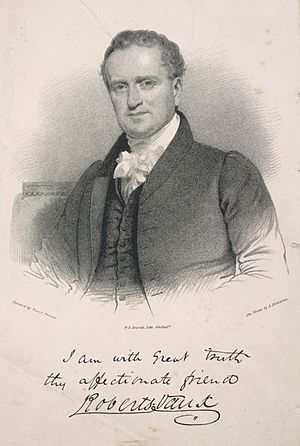Roberts Vaux facts for kids
Quick facts for kids
Roberts Vaux
|
|
|---|---|
 |
|
| Born | January 25, 1786 Philadelphia |
| Died | January 7, 1836 (aged 49) Philadelphia |
| Occupation | Jurist |
Roberts Vaux (born January 25, 1786 – died January 7, 1836) was an important American figure. He was a lawyer, a judge, and someone who worked to end slavery. He also helped many people through his charity work.
Contents
Early Life and Family
Roberts Vaux was born in Philadelphia, Pennsylvania. He was the oldest son in a well-known Quaker family. Quakers are a religious group known for their values of peace and helping others. He went to private schools in Philadelphia to get his education.
Making a Difference
Vaux became a lawyer in 1808. He quickly became very good at his job. Later, he became a judge in Philadelphia. He lived by Quaker values, which meant he believed in doing good for society.
He played a big part in starting Pennsylvania's public school system. For 14 years, he was the first president of the board of public schools in Philadelphia. He was also a member of more than 50 groups that helped people.
Helping Others
Roberts Vaux was very interested in ending slavery. He also cared about issues affecting Native Americans. He helped create several important organizations, including:
- The Pennsylvania School for the Deaf, which helped deaf students.
- The School for the Blind, which helped blind students.
- The Philadelphia Savings Fund Society, a bank that helped people save money.
- The Historical Society of Pennsylvania, which preserves history.
- The Frankford Asylum for the Insane (now Friends Hospital), which helped people with mental health issues.
He was also a member of important scientific groups, like the American Philosophical Society.
Prison Reform
Vaux cared a lot about improving prisons. He worked to make prisons better and fairer. He helped create the Eastern State Penitentiary, a famous prison. He worked hard to change how prisoners were treated. A famous French writer, Alexis de Tocqueville, even dedicated a book about prison reform to Vaux after visiting America.
His Writings
Roberts Vaux also wrote several books. These books often shared stories of people who worked for good causes. Some of his writings included:
- Memoirs of the Lives of Benjamin Lay and Ralph Sandiford (1815)
- Memoirs of the Life of Anthony Benezet (1817)
- Notices of the Original and Successive Efforts to improve the Discipline of the Prison at Philadelphia (1826)
His Family and Death
In 1814, Roberts Vaux married Margaret Wistar. They had two sons, Richard and Thomas. His son, Richard Vaux, became the mayor of Philadelphia. Richard also served in the United States House of Representatives.
Roberts Vaux passed away in Philadelphia on January 7, 1836. He was 49 years old. He was buried at the Arch Street Friends Meeting House burial ground.
Legacy
Today, a school in Philadelphia is named after him: the Roberts Vaux Junior High School. It was built during the Great Depression. The school shows how important Roberts Vaux was to education and helping his community.
 | George Robert Carruthers |
 | Patricia Bath |
 | Jan Ernst Matzeliger |
 | Alexander Miles |

